lk英语语法点练习9-时态4:将来时间表示法
表示将来时间的几种方法
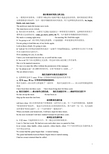
表示将来时间的几种方法:1.一般现在时表将来,主要用于确定的计划或不随主观意志而改变的,按时刻表或日程表安排将要进行的动作。
句中一般有明确的将来时间状语。
用于这种情况的动词有:be, begin, finish, end, start, learnThe professor starts his lecture next week.The train leaves at six o'clock.2. 现在进行时表将来,主要用于近期计划或表示一种即将发生的情形。
这种情形常常用于那些表示运动的动词:come, go, leave, arrive, fly等。
句中通常有明确的将来时间状语。
My uncle is coming right away. I'm meeting Mr. Drell this night.3. “be going to do"表示事先考虑过的意图,计划或根据一些客观事实所作的预见。
I'm not going to lend him any of my books again.Look at these clouds. It's going to rain.4. "will do"表示对事态发展的预见或在一定条件下的意图或意志;这种情形可以用于行有条件从句或时间从句的句中。
I'll fo anything for you, if you like.Unless you work hard from now on, or you'll fail the exam.5. "be to do"用于表示近期的正式安排,传达命令指示或分配工作任务等。
She is to be married tomorrow.No one is to enter the office without the permission of the manager.6. " be about to do" 表示瞬时将来时间,以为“顷刻或马上就要……"The are about to leave.现在完成时与现在完成进行时1. 这两种时态在与since 和for 引导的时间状语连用时有所不同A. 在与since 和for 引导的时间状语连词时:现在完成时---表示动作已经延续了一段时间现在完成进行时——表示动作将要延伸到将来I have been here for three years. I have been living here for three years.B. 现在完成时——表示动作已经完成。
将来时间表示法

表示一般将来时间的结构
will/shall + do
意图;预见
will/shall+be doing
纯将来;将来进行
Will/shall+have done
将来完成
will/shall + do VSbe going to do
will/shall + do:当事人认为会发生,临时想到的‘意图’;
be going to do:有迹象标明会发生,事先考虑过的‘意图’
be going to do VSbe doing
be going to do:已考虑过的意图,主观的、随时可以改变;
be doing:肯定的安排,不容改变,甚至不顾当事人的意图
be to do
官方消息(报纸、新闻),命令、禁止、可能性;用于正式语体
过去将来完成
was/were doing
与be doing类似
was/were going to do
与be going to do类似;没有实现的意图
was/were to do
表示过去将来的安排,不可避免要发生的事情;安排未执行则用was/were to have done
was/were about to
present tense
用于条件、时间状语分句;按既定日程一定会发生
be about to
‘即将’,通常不用表示将来的时间状语
表示过去将来时间的结构
would do
Байду номын сангаас用于从属分句
would be doing
过去进行;过去将来与will/shall + be doing相同
would have done
表示将来的时态(一般现在时表将来,现进表将来以及一般将来时)

我相信,中国将会变成世界上最富有的国家之一。
There is going to be a heavy rain.
将会பைடு நூலகம்一场大雨。
②be going to和will均可表示“意图”:事先考虑过的意图用be going to;不是 事先考虑的意图即临时决定的用will。 I’m going to Qingdao this weekend. 这个周末我要去青岛。 —Sorry,I forgot to buy the book you need. ——对不起,我忘了去买你要的书了。 —It doesn’t matter. I will go myself. ——没关系。我自己去买就行了。
一般现在时
在时间和条件状语从句中可用一般现在时代替
一般将来时。 I’ll let you know as soon as I hear from him. 我一接到他的信就告诉你。
现在进行时
有些动词,如come, go, leave, return, arrive,
begin, start等,它们的现在进行时可表示不远 的将来要发生的事情。例如: Flight 1095 is landing soon. 第1095号航班马上要着陆了。
(
(
)5. Look! Some visitors __ for the bus over there. (2015南宁) A. are waiting B. is waiting C. waiting D. Wait
( (
) 6. ---What were you doing at 5:30 yesterday afternoon? --- I ______ with Sam.(2016 钦州) A. walk B. walks C. was walking D. walked )7. — What are you going to do tomorrow?(2014 柳州) — I ______ visit my aunt. A. went to B .go to C. am going to
将来时间表示法
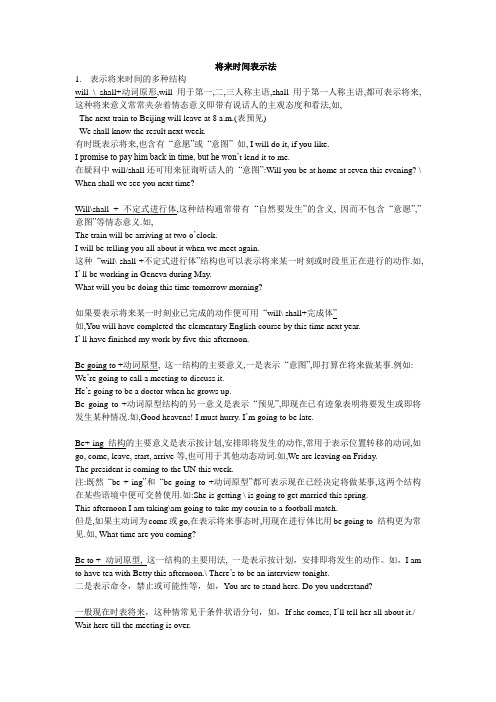
将来时间表示法1.表示将来时间的多种结构will \ shall+动词原形,will 用于第一,二,三人称主语,shall 用于第一人称主语,都可表示将来,这种将来意义常常夹杂着情态意义即带有说话人的主观态度和看法,如,The next train to Beijing will leave at 8 a.m.(表预见)We shall know the result next week.有时既表示将来,也含有“意愿”或“意图”如, I will do it, if you like.I promise to pay him back in time, but he won’t lend it to me.在疑问中will/shall还可用来征询听话人的“意图”:Will you be at home at seven this evening? \ When shall we see you next time?Will\shall + 不定式进行体,这种结构通常带有“自然要发生”的含义, 因而不包含“意愿”,”意图”等情态意义.如,The train will be arriving at two o’clock.I will be telling you all about it when we meet again.这种“will\ shall +不定式进行体”结构也可以表示将来某一时刻或时段里正在进行的动作.如, I’ ll be working in Geneva during May.What will you be doing this time tomorrow morning?如果要表示将来某一时刻业已完成的动作便可用“will\ shall+完成体”如,You will have completed the elementary English course by this time next year.I’ ll have finished my work by five this afternoon.Be going to +动词原型, 这一结构的主要意义,一是表示“意图”,即打算在将来做某事.例如: We’re going to call a meeting to discuss it.He’s going to be a doctor when he grows up.Be going to +动词原型结构的另一意义是表示“预见”,即现在已有迹象表明将要发生或即将发生某种情况.如,Good heavens! I must hurry. I’m going to be late.Be+-ing结构的主要意义是表示按计划,安排即将发生的动作,常用于表示位置转移的动词,如go, come, leave, start, arrive等,也可用于其他动态动词.如,We are leaving on Friday.The president is coming to the UN this week.注:既然“be +-ing”和“be going to +动词原型”都可表示现在已经决定将做某事,这两个结构在某些语境中便可交替使用.如:She is getting \ is going to get married this spring.This afternoon I am taking\am going to take my cousin to a football match.但是,如果主动词为come或go,在表示将来事态时,用现在进行体比用be going to 结构更为常见.如, What time are you coming?Be to + 动词原型, 这一结构的主要用法, 一是表示按计划,安排即将发生的动作。
将来时的常见表达法

JU□山东朱秀兰一般将来时表示将来要发生的动作或存在的状态,即表示将来时间。
常见的将来时间状语有:tomorrow,the day after tomorrow,tomorrow morning/ afternoon/evening;in2014,in two days;next week/Sunday/month/term/year;this Monday/week/month/year;in a minute/moment;at once;today;in the future, soon,some day,one day;before long等。
1.M be going to+动词原形”。
be要根据主语人称和数的需要转换为is,am或are o此结构表示将要发生的事情或打算、计划、决定在最近或将来要做的事;也可以表示主观意愿,即表示事先经过考虑之后做出的计划或安排。
例如:Miss Li is going to be a doctor in the future.李小姐将来想当医生。
They have bought some cloth,they are going to make themselves coats.他彳f]买了些布料,准备自己做外套。
I'm going to leave for Canada next year.我计划明年去加拿大。
He's going to reach America in a few hours.几个小时后他将到达美国。
“be going to+动词原形”表示根据已有的迹象判断要发生的某种事态。
这种场合往往不需要有时间状语与之连用。
例如:Be careful!You are going to run into the tree.小心!你快要撞到树上了。
Look at the dark clouds.It is going to rain.看这乌云,像是要下雨了。
将来时间表达法
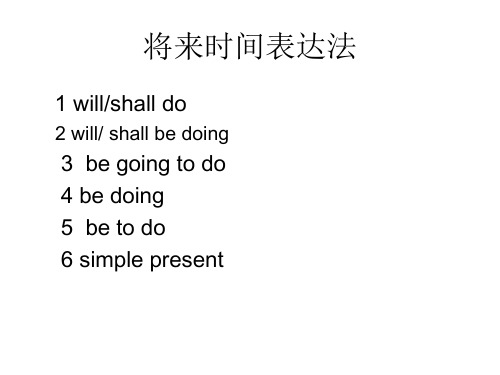
1)表说话人的“预见” e.g.: You will feel better after taking this medicine. We shall know the result next week. 2) 表主语的“意愿”或“意图” e.g.: I will do it, if you like. As the railway is not yet open to traffic, we shall go by boat. I promise to pay him back in time, but he won’t lend it to me.
5. Be to do
1) 表按计划或决定。 e.g.: The Queen is to visit Japan next year. The Prime Minister is to speak on television tonight.
3. Be going to do
1) 通常表句子主语的“意图”,即打算在将 来作某事。有时该意图不是句子主语的。 e.g.: Are you going to post that letter by air mail? How long is he going o stay here? He’s not going to cheat me again(=I won’t let him cheat me again. The wall is going to be painted green(=We or sb. Else intend to paint the wall green)
2) 表命令、禁止或可能性。 e.g.: You are to stand here. Do you understand? The dictionary is not to be had here. * 表按计划、安排将要发生的时态时,既可用 be doing, 也可用be to do, 后者较常用于正 式语体。
初中英语一般将来时(结构、用法、练习全解析)
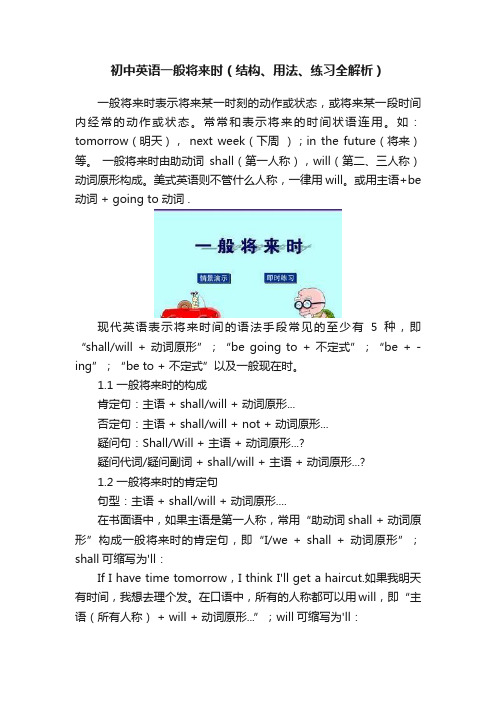
初中英语一般将来时(结构、用法、练习全解析)一般将来时表示将来某一时刻的动作或状态,或将来某一段时间内经常的动作或状态。
常常和表示将来的时间状语连用。
如:tomorrow(明天),next week(下周);in the future(将来)等。
一般将来时由助动词shall(第一人称),will(第二、三人称)动词原形构成。
美式英语则不管什么人称,一律用will。
或用主语+be 动词 + going to 动词 .现代英语表示将来时间的语法手段常见的至少有5种,即“shall/will + 动词原形”;“be going to + 不定式”;“be + -ing”;“be to + 不定式”以及一般现在时。
1.1 一般将来时的构成肯定句:主语 + shall/will + 动词原形...否定句:主语 + shall/will + not + 动词原形...疑问句:Shall/Will + 主语 + 动词原形...?疑问代词/疑问副词 + shall/will + 主语 + 动词原形...?1.2 一般将来时的肯定句句型:主语 + shall/will + 动词原形....在书面语中,如果主语是第一人称,常用“助动词shall + 动词原形”构成一般将来时的肯定句,即“I/we + shall + 动词原形”;shall可缩写为'll:If I have time tomorrow,I think I'll get a haircut.如果我明天有时间,我想去理个发。
在口语中,所有的人称都可以用will,即“主语(所有人称) + will + 动词原形...”;will可缩写为'll:Some day,I'll tell you.将来某一天我会告诉你的。
1.3 一般将来时的否定句句型:主语 + will/shall + not + 动词原形...一般将来时的否定句是在will/shall后加not;will not可缩写为won't;shall not可缩写为shan't:Mary won't go to the party.玛丽不会去参加晚会。
将来时的六种表示法

一般将来时的六种表示法一、will/shallwill/shall通常用来表示将来时间。
Will用于第一、二、三人称主语,shall用于第一人称主语,都可以表示将来时,但是这种意义通常夹杂着情态意义,即带有说话人的主观态度和看法,比如表示“预见”:You will feel better if you after taking this medicine.He won’t be here in time unless he comes by air.We shall know the result next week.I am sure that I shall not lose my way in the woods.有时候表示将来,也含有“意愿”或“意图”I will do it if you like it.As the railway is not yet open to traffic, we shall go by boat.I promised to pay him back in time, but he won’t lend it to me.二、be going to这一结构的主要意义,一是表示“意图”,即打算在将来做什么。
Are you going to post that letter by air mail?How long is he going to stay here? 由于没有语境的限制,也可以换成will。
We’re going to call a meeting to discuss it.意图的体现者通常是句子的主语,但也有可能不是。
如:He’s not going to cheat me again.(=I won’t let him cheat me again.)二是表示“预见”,即现在已有的迹象表明将要或即将发生某种情况。
如:I feel dizzy. I think I am going to faint.Good heavens! I must hurry. I’m going to be late.Look at that black clouds——there is going to be a storm.表“意图”的用法有时候可以与“will+do”互换使用,但是也要注意区分。
表示将来时间的常见方法英语时态知识点
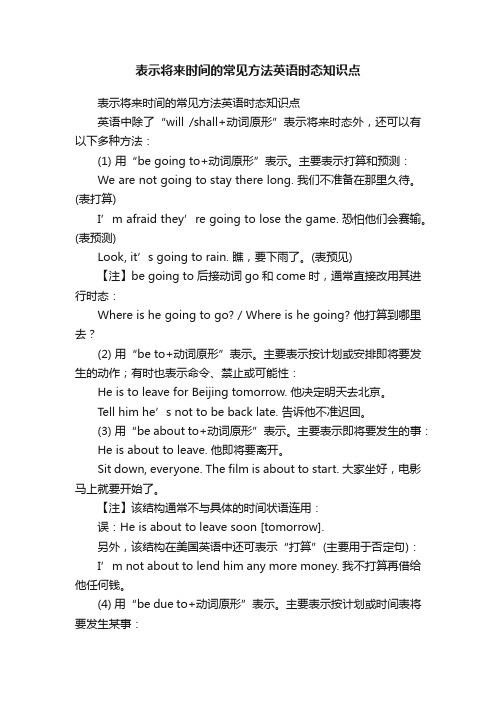
表示将来时间的常见方法英语时态知识点表示将来时间的常见方法英语时态知识点英语中除了“will /shall+动词原形”表示将来时态外,还可以有以下多种方法:(1) 用“be going to+动词原形”表示。
主要表示打算和预测:We are not going to stay there long. 我们不准备在那里久待。
(表打算)I’m afraid they’re going to lose the game. 恐怕他们会赛输。
(表预测)Look, it’s going to rain. 瞧,要下雨了。
(表预见)【注】be going to 后接动词go和come时,通常直接改用其进行时态:Where is he going to go? / Where is he going? 他打算到哪里去?(2) 用“be to+动词原形”表示。
主要表示按计划或安排即将要发生的动作;有时也表示命令、禁止或可能性:He is to leave for Beijing tomorrow. 他决定明天去北京。
Tell him he’s not to be back late. 告诉他不准迟回。
(3) 用“be about to+动词原形”表示。
主要表示即将要发生的事:He is about to leave. 他即将要离开。
Sit down, everyone. The film is about to start. 大家坐好,电影马上就要开始了。
【注】该结构通常不与具体的时间状语连用:误:He is about to leave soon [tomorrow].另外,该结构在美国英语中还可表示“打算”(主要用于否定句):I’m not about to lend him any more money. 我不打算再借给他任何钱。
(4) 用“be due to+动词原形”表示。
主要表示按计划或时间表将要发生某事:He is due to leave very soon. 他很快就要离开。
Lesson 9(Grammar)课件-一般将来时

Do句型一般将来时变化
根据以下要求变化下面句子
❖ It will be Christmas soon.
否定句:_____________________. 选择疑问句: _____________________.( the Spring Festival )
❖ She will have an English lesson the day after tomorrow.
Lesson 9 Grammar
句子的两大形态
静态
动态
Be 句型用来描 述单个物体的 静态性质或者 物体与物体之 间的静态关系
Do 句型用来描 述单个物体的 动态性质或者 物体与物体之 间的动态关系
时态分类
一般现在时: 表达经常发生的动作 或者永恒不变的动作
一般过去时: 表达过去某个时间点
发生的动作
❖ He is going to see his grandpa tomorrow.
否定句: _____________________________. 一般疑问句: _________________________ . 特殊疑问句: _________________________ .(对下划线成分提问)
一般疑问句:_____________________________________. 特殊疑问句:_____________________________________ .(对下划线成分提问)
❖ I am going shopping this afternoon.
特殊疑问句:_____________________. 选择疑问句: _____________________.(go fishing )
09-一般将来时

09-一般将来时第一篇:09 - 一般将来时一般将来时1.概念:表示将要发生的动作或存在的状态及打算、计划或准备做某事。
2.时间状语:tomorrow、next day(week、month、year…)、soon、in a few minutes、by…,the day after tomorrow、etc.3.基本结构:主语 + am/is/are + going to + do;will/shall + do.4.否定形式:am/is/are not going to do ;will/shall not do。
5.一般疑问句:be放于句首;will/shall提到句首。
6.例句:They are going to have a competition with us in studies.他们将要与我们在学术上进行一次比赛。
It is going to rain.要下雨了(1)基本用法[1]常用来表示将来时间的动作或状况。
Helena will be twenty next year.海伦娜明年就二十岁了。
[2]用于真实条件句和时间状语从句的主句中表示将来的情况。
I'll tell you as soon as he comes.他一来我就告诉你。
[3] 用于条件状语从句表示愿望或意愿。
If you will wait for me, I shall come back soon.如果你愿意等我,我马上就回来。
[4] 可用来表示一种倾向或习惯性动作。
The shop won't open until nine.这家商店九点才会开门。
Children will be children.孩子就是孩子。
(2)be going to +动词原形这一结构表示打算或准备好要做的事或有迹象表明要发生的天气变化等情况。
What are you going to do during the summer holiday? 你暑假打算做什么? The train is going to arrive.火车就要到了。
将来时知识点总结

将来时知识点总结将来时是英语语法中的一个重要时态,用来表达将来的动作、情况或事件。
在英语中,将来时有多种形式,包括一般将来时、进行将来时、完成将来时等。
本文将从这几个方面,总结将来时的知识点。
一、一般将来时1.构成一般将来时的构成形式为:will / shall + 动词原形。
例如:I will go to the park tomorrow.(我明天会去公园。
)2.用法一般将来时用来表达将来的动作、情况或事件。
例如:She will study abroad next year.(她明年将出国留学。
)二、进行将来时1.构成进行将来时的构成形式为:be going to + 动词原形。
例如:They are going to visit Beijing next month.(他们下个月将去北京旅行。
)2.用法进行将来时用来表达按计划或安排将要发生的事情。
例如:We are going to have a party next Saturday.(我们下周六将举办一场派对。
)三、完成将来时1.构成完成将来时的构成形式为:will / shall + have + 过去分词。
例如:By next year, I will have graduated from college.(到明年,我将毕业于大学。
)2.用法完成将来时用来表达将来某个时间点之前完成的动作、情况或事件。
例如:They will have finished the project by the end of this month.(到本月底,他们将完成这个项目。
)总结:1. 将来时有一般将来时、进行将来时、完成将来时等不同形式,每种形式都有不同的构成方式和用法。
2. 一般将来时用于表达将来的动作、情况或事件,常与表示将来的时间状语连用,如tomorrow(明天)、next week(下周)等。
3. 进行将来时用于表达按计划或安排将要发生的事情,表示较为确定的将来动作。
将来时的几种表达方式

一般将来时的几种表达方式一般将来时表示将来某个时间要发生的动作或存在的状态,也表示将来经常或反复发生的动作,常与表示将来的时间状语连用.例如:tomorrow , tomorrow morning / afternoon …, the day after tomorrow , next year , next month …, from now on <从现在开始>,in an hour <一小时后>,in two days / weeks …等.一般将来时的表示方法有以下多种形式:1. will / shall<1> will/shall do表示将来时间时,一般要与表示将来的时间状语连用,或通过一定的上下文来体现将来时间状语.s hall只用于第一人称,will可以通用于各种人称.在问句中shall 常用于第一人称表示建议或征求对方意见.例如:A. I shall write you a letter next month .我下个月给你写信.B. He will e.他会来.C. Shall we go to the park ?我们去公园好吗?注意:在You and I…或Both of us之后通常用will而不用shall,例:Both of us will be at the meeting tomorrow.明天我们俩都会出席会议.<2> will/shall be doing因为在will/shall do中的will/shall也可理解为情态动词,所以有时会难区分它们是将来意义还是情态意义.在英语口语中我们常用will/shall be doing来表示"单纯的"将来时间.比较下列句子:I will e tomorrow.Will you e?我明天来!你来吗?〔will表示意图和请求〕I will be ing tomorrow.Will you be ing?我明天来,你来吗?〔will在句中单纯表示将来〕这一结构还表示不久或势必要发生的动作,例:The train will be arriving soon.火车很快就到站了.I’ll be meeting you next year.我明年与你再见面.或表示将来某一时刻或某一段时间正在进行的动作,例:He’ll be working at the office at nine tomorrow morning.他明天上午九点在办公室工作.I’ll be spending my holiday in China this summer.今年夏天我在中国度假.<3> will/shall have done此结构表示在将来另一个动作之前发生的动作,或者在将来某一特定时刻之前已经完成的动作,例:Tomorrow at ten o’clock,he will have received your letter.明天十点钟他将已经收到你的信了.I’ll have finished my work by five this afternoon.今天下午五点钟我将完成工作.<4> will/shall have been doing此结构表示在将来某一时刻之前开始的动作到那个时刻仍在继续进行,例:I’ll have been working for six hours by the time you e back.到你回来时我将已经连续工作了6个小时了.2. be going to do<1>这种结构表示主体现在的意图,即打算在最近或将来要做某事,主语通常指人.在被动句中,主语可以是物,但动作的执行者当然仍是人,例如:A. What are you going to do next Sunday ?下星期天你打算干什么?B. She’s going to be a teacher . 她打算当一名教师.C. The wall is going to be brushed white .这面墙将刷成白色.<2> 表示有迹象表明将要发生某种情况,一般指客观事态的发展,而不是表示主观的意图.句中的主语可以指人,也可指物,或者非人称代词it.例如:A. Look at these black clouds . —It’s going to rain .看这些乌云.天快要下雨了.B. I’m afraid I’m going to have a bad cold .恐怕我要得重感冒.注:be going to与will用法上的比较说明:<1>be going to与will都可用来表示即将发生的事情.前者多用于口语,后者常用于书面语和正式文告中.例如:A. There’ll <=is going to> be a football match in our school next week .下周我校将举行〔有〕一场足球赛.B. The American basketball team will arrive in Beijing tomorrow .美国篮球队明天将抵达.<2>be going to 与will都可用来表示意图.例如:I will <=am going to>climb the hill tomorrow . 我将于明天去登山.注:一般来说,"意图"是事先经过考虑的,用be going to表示;反之则用will.will还多用于对话中,即一方听了对方的话后所作出的反应.例如:A. They’re going to meet at the school gate . 他们打算在学校大门见面.B. ——Please bring me a cup of tea . 请给我端杯茶来.——I’ll do it in a minute . 我马上就去〔端〕.<3>be going to常含有"即将"之意;而will即可表示"即将"又可表示"较长时间后的未来",或不表示任何特定的将来时间概念.例如:A. We’re going to visit the factory .我们即将去参观那家工厂.B. He’ll write a book one day .他有朝一日要写书.C. The house will break down .那屋子〔迟早〕要倒塌.<4>表示预测:"be going to"表示有发生某事的迹象;will则表示说话者认为或相信要发生某事.例如:A. It’s very dark and cold . It’s going to snow .天很暗而且非常冷,要下雪了.B. I’m sure he’ll be back in an hour .我确信他一小时后会回来.<5>在表示"询问对方是否愿意"以与表示"客气的邀请"时,常用will.例如:A. Will you lend me the book ? 你能把那本书借给我吗?B. Will you go there with us ? 你能和我们一起去那儿吗?<6>be going to可用于条件句,表示将来的时间,will一般不能.例如:If you are going to watch TV this evening , you’d better finish your homework now .你若想今晚看电视,最好现在就完成作业.注:如果不是表示将来的时间,而是表示"意愿、坚持、推论"等,will也可用于条件句.例如:A. If you will learn English , I’ll help you .你若愿意学习英语,我将帮助你.B. If you will kindly wait a moment , I’ll ask him to go there with you .你若耐心等一会的话,我将叫他和你一起去那儿.3. be about to do这种结构表示"最近或马上要发生的动作".例如:A. The meeting is about to begin . 会议马上开始.B. Summer harvest is about to start . 夏收即将开始.4. be doing<1>这种结构表示按计划即将发生的动作,常用于表示位置移动的动词.例如:go ,e , leave , start , arrive , move , return , fly <乘飞机>等,例如:A:We’re leaving on Friday.B: The President is ing to the UN this week.注:以上说的"安排"是指在说话时刻之前已经决定了的安排,常带有表示将来的时间状语,如果不带时间状语,根据上下文也可表示即将发生的动作,如:M: Where are you going?F: I’m going for a walk. Are you ing with me?M: Yes, I’m just ing. Wait for me.<2>现代英语中,有相当多的动态动词也可用be doing表示将来,如:Dinner is ready. We’re having fish for dinner.I’m spending my holidays in London this year.Dannay isn’t finishing high school until next year.<3>be doing与be going to do 都表示已经决定将做某事,所以在某些语境中可以互换,如:She is getting/is going to get married this spring.We are having/are going to have fish for dinner tonight.注:如果主动词为e, go,用be doing 比be going to 更为常见,如:We’re going to a concert tonight.What time are you ing?<4> be doing表将来还可带有其他情态意义,如:I’m not sitting on that hard seat. = I won’t sit on that hard seat.You’re not staying here any longer. = I won’t allow you to stay here any longer.5. be to do这种结构着重指按计划或安排将要发生某事.<1>常见于报纸、广播等,用以宣布官方的计划或决定,如:A. The Queen is to visit Japan next year.B. The Prime Minister is to speak on television tonight.<2> 一般是指受人指示、制约的动作,它有命令、禁止或可能性的含义,如:A:You are to stand here. Do you understand?B: Tell her she’s not to be back late.C: The dictionary is not to be had here.比较下面两句话:I am going to finish the work this afternoon.我打算今天下午完成工作.〔表示现在意图〕I am to finish the work this afternoon.我应该今天下午完成工作.〔表示计划、安排或受人指示〕注:be to do 与be doing都可表示按计划、安排将要发生的事,这两种结构常常可以互换,但be to do常用于正式语体.6. 用一般现在时表示将来<1>由"if , when , as soon as , until , till , after , before"等引导的条件或时间状语从句中,通常用一般现在时表将来.例如:If she es, I’ll tell her all about it.It won’t be long before the rain stops.<2>表示按照时间表或既定日程一定会发生的将来事态.例如:A. I’m free this afternoon.我今天下午有空.B. School starts on September 1.学校9月1日开学.C. The train leaves at 7:30 this evening.火车今晚7:30开.D. If you use your head, you’ll have a good idea.如果你动动脑筋,就会想出好办法.E. I’ll give the bo ok to him as soon as he returns.他一返回来,我就把书给他注:be doing与一般现在时都常与表示位置移动的动词连用,且都有按计划、安排的含义,但一般现在时所暗示的计划比较客观,因而更不可变,而且一般现在时表将来比be doing更正式.<3>在某些定语从句中可用一般现在时表示将来时间.例如:The first person who opens that door will get a shock.谁要是先开开那扇门准会吓坏的.There’ll be a special price for anybody who orders a suit in the next two weeks.任何人在下两周内定做衣服都将享受优惠价格.。
将来时等主要语法点
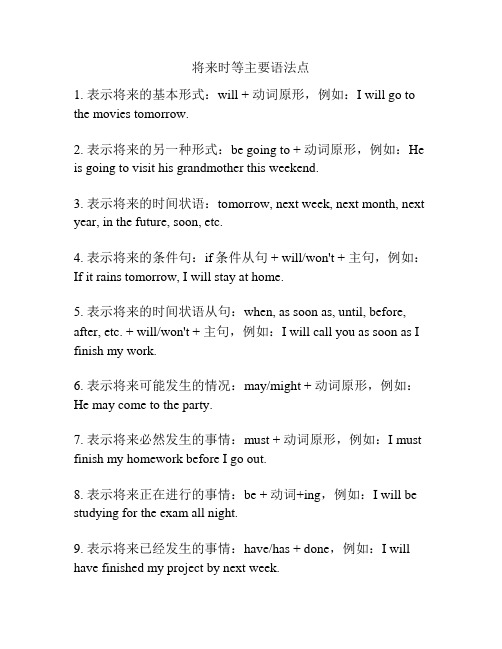
将来时等主要语法点
1. 表示将来的基本形式:will + 动词原形,例如:I will go to the movies tomorrow.
2. 表示将来的另一种形式:be going to + 动词原形,例如:He is going to visit his grandmother this weekend.
3. 表示将来的时间状语:tomorrow, next week, next month, next year, in the future, soon, etc.
4. 表示将来的条件句:if条件从句 + will/won't + 主句,例如:If it rains tomorrow, I will stay at home.
5. 表示将来的时间状语从句:when, as soon as, until, before, after, etc. + will/won't + 主句,例如:I will call you as soon as I finish my work.
6. 表示将来可能发生的情况:may/might + 动词原形,例如:He may come to the party.
7. 表示将来必然发生的事情:must + 动词原形,例如:I must finish my homework before I go out.
8. 表示将来正在进行的事情:be + 动词+ing,例如:I will be studying for the exam all night.
9. 表示将来已经发生的事情:have/has + done,例如:I will have finished my project by next week.。
英语中表示将来时间的5种方法
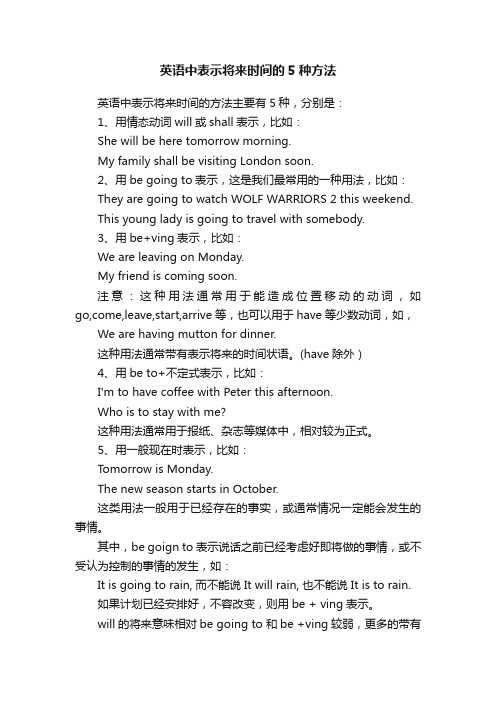
英语中表示将来时间的5种方法英语中表示将来时间的方法主要有5种,分别是:1、用情态动词will或shall表示,比如:She will be here tomorrow morning.My family shall be visiting London soon.2、用be going to表示,这是我们最常用的一种用法,比如:They are going to watch WOLF WARRIORS 2 this weekend.This young lady is going to travel with somebody.3、用be+ving表示,比如:We are leaving on Monday.My friend is coming soon.注意:这种用法通常用于能造成位置移动的动词,如go,come,leave,start,arrive等,也可以用于have等少数动词,如,We are having mutton for dinner.这种用法通常带有表示将来的时间状语。
(have除外)4、用be to+不定式表示,比如:I'm to have coffee with Peter this afternoon.Who is to stay with me?这种用法通常用于报纸、杂志等媒体中,相对较为正式。
5、用一般现在时表示,比如:Tomorrow is Monday.The new season starts in October.这类用法一般用于已经存在的事实,或通常情况一定能会发生的事情。
其中,be goign to表示说话之前已经考虑好即将做的事情,或不受认为控制的事情的发生,如:It is going to rain, 而不能说 It will rain, 也不能说 It is to rain.如果计划已经安排好,不容改变,则用be + ving表示。
will的将来意味相对be going to 和be +ving较弱,更多的带有主观的态度。
英语语法-将来时用法及练习题

目录1 be going to+动词原形 (3)2 主语+will(shall)+动词原形~. (5)3一般将来时的用法区别 (9)4过去将来时 (10)练习题 (12)答案 (13)将来时包括一般将来时和过去将来时。
一般将来时表示将来某个时间要发生的动作或存在的状态,也表示将来经常或重复发生的动作,常与表示将来的时间状语连用,如:tomorrow,next year,soon……等。
例:I'm going to study tomorrow.我打算明天去学习。
I will(shall)study tomorrow.我明天将去学习。
我们已经学习了一般现在时、一般过去时,它们和一般将来时是一个什么样的关系呢?一般现在时,表示目前(现在)习惯或经常性的动作。
以现在为基准,叙述过去某时的事情,用过去时。
而以现在为基准,叙述将来的事情时,则用将来时。
1. I cleaned my room yesterday.2. I clean my room every day.3. I am going to(=will) clean my room tomorrow.句1是一般过去时,叙述过去的某时(昨天)发生的事,和现在没有关系。
只是说明我昨天打扫了房间。
句2是一般现在时,叙述的是经常性的动作,我每天打扫房间,已成为一种习惯。
句3是叙述将来某个时间(明天)要发生的事。
我明天要打扫房间。
注意在英语中,不同的时态,必须以不同的动词形式来表达。
一般将来时的构成:A.主语+be(am,is,are) going to+动词原形~.B.主语+will(shall)+动词原形~1 be going to+动词原形对于将要发生的事,或打算、计划、决定要做的事情时,皆以《be going to +动词原形~》的句型来表示。
因为此句型含有be动词,所以是否用am,are,is,决定于主语。
1 肯定句主语+be(am,are,is) going to+动词原形~.I am going to play football next Sunday.下周日我打算踢足球。
将来时间表示法

Be + -ing
• 表示按计划、安排即将发生的动作,常用于表示位置转移 的动词,如go, come, leave, start, arrive等 • We’re leaving on Friday. • 许多动态动词都可用现在进行体表示将来 • He is writing to you tomorrow. • “Be+ing”和“be going to+不定式”都可表示现在已经决 定将做某事,两者在某些语境中可交替使用 • She is getting married this spring. • She is going to get married this spring.
Will / shall + infinitive
• Will用于第一、二、三人称主语,shall用于第一人称主语, 这种将来意义常常带着说话人的主观态度和看法 • You will fail the test if you don’t work hard. • We shall know the result next week. • 既表将来又有意愿或意图 • I will do it, if you like. • 在疑问句中,可用来征询听话人的“意图” • Will you be at home this morning?
Would + infinitive Was / were going to + infinitive
past future
Was / were to + infinitive Past progressive and simple past Was / were about to + infinitive
Will / shall + progressive /perfective infinitive
将来时态的使用方法

5、 be going to+不定式
“be going to+不定式”的另一意义是表达说话人对可能性的预见,即现在已经有迹象表 明将要发生或即将发生某种情况。例如: ① A: The ceiling in this room doesn't look very safe, does it? B: No, it looks as if it is going to fall down. ② I feel terrible. I think I'm going to be sick. “will+不定式”和“be goingto+不定式”在表达“预见”时的区别主要在于:be going to结构暗示 有迹象表明某事件即将发生,而will 结构则表示作者认为或相信某事即将发生。
6、 现在进行体
现在进行体表示根据计划或安排将要发生的动作。当动词为go,come,leave, start, arrive,visit 等时,我们通常用现在进行体而不用be going to 结构。例如: They are going to Madrid(马德里) next Sunday. Mary is leaving the day after tomorrow. Ian isn't playing football on Saturday. He's hurt his leg. I'm not working tomorrow, so we can go out somewhere.
B: Yes, I know. I _______ (clean) them later. (5) I’ve decided not to stay here any longer. Tomorrow I ______ (look) for somewhere else to stay. (6) Don’t worry about your exam. I’m sure you _____ (pass).
lk英语语法点练习9-时态4:将来时间表示法

Means of expressing future time将来时间表示法一、将来时间表示法1. 情态助动词Modal auxiliary –will/shall :Will/shall do通常用来表示表示将来时间,常常带有情态色彩,即说话人的主观态度和看法可表示预测,预见(Prediction), 意图(Intention), 意愿(Willingness), eg:1) A: Waiter, will my pizza be long? B: No, I expect it will be round as usual.2) Two fish were swimming together in a river.“Look,” said the first one. “It’s starting to rain.”“Quick. Let’s swim under the bridge,” said the second fish, “or we’ll get wet.”3) You will feel better after taking this medicine.4) I will do it, if you like.5) What shall I do with your mail? (征询听话人的意图)will/shall be -ing表示自然要发生(不包含意图和意愿*intention, *willingness)1) The train will be arriving at two o’clock.2) You can use my bike. I won’t be needing it tomorrow.表示将来某个时间动作正在进行, eg:1) I’ll be working in America during May.2) What will you be doing this time tomorrow morning?比较Will do & will be doing (同为表预测时prediction)Will do: 常常带有说话人的主观态度和看法& Will be doing: 表示自然要发生will/shall have done: 在将来某个点上某个动作已完成或刚刚完成1) I’ll have finished my work by five this afternoon.2) Before long he will have forgotten all about it.Will/shall have been –ing某个动作在将来某个点之前已经持续了一段时间,而且还可能继续下去1) By the end of this month I will have been working here for 20 years exactly.2) If it rains again tomorrow, then it will have been raining for a whole week.Will be doing/ will have done/ will have been doing在一定语境下并不表示将来而仅指说话者的猜测,如:1) It’s already six o’clock. He won’t be working now.2) He will have received my letter by now.3) You’ll have been wondering all this time how my invention works.2. Semi-auxiliary半助动词a. Be going to do1)打算在将来做某事A: I am going to buy one of those small Japanese radios. B: But how will you understand what they are saying?How long is he going to stay here?He’s going to be a doctor when he grows up.2)Feeling of certainty (prediction) 表预测、预见时表示已有迹象表明要发生或即将发生某种情况Eg: (Look at the watch) I must be hurry. I’m going to be late.I feel dizzy. I think I’m going to faint.Look at these black clouds – there’s going to be a storm.✧比较Will do & be going to doPrediction表预测、预见时Will: 说话者认为、相信某事要发生Be going to: 有迹象表明某事要发生Intention表意图时Be going to: 有事先经过考虑过Will: 临时想到的1) A. Why are you taking down all the pictures? B: I’m going to repaper the room.2) A: What a terribly heavy box! B: I’ll help you to carry it.b. Be to do:表示按计划、安排即将发生的动作,如:1) I am to have tea with Betty this afternoon.常见于报纸和广播,用于宣布官方计划或决定,如:The Queen is to visit Australia next year.表命令,禁止等,如:You are to stand here. Do you understand? Tell her she’s not to be late again.表注定:Everyone is to die.3. Present progressive (be doing)现在进行时: 表按计划、安排即将发生的动作,常用表示位置转移的动词,如go, come, leave, start, arrive等,也可用于其他动态动词We’re leaving on Friday.The plane is taking off at 5:20.We’re moving to a different hotel the day after tomorrow.✧比较be doing & be to do两者都有确定计划,后者更加正式,且可以表示命令、禁止等;✧比较be doing & be going to doBe doing 有计划和安排& be going to do只不过考虑了一下,并无确定的计划4. Simple present一般现在时常见于条件句和时间分句中(more frequent than in main clauses):If she comes, I’ll tell her about it.I’ll give it to you after I return.在主句中用一般现在时表示将来时间通常指按照时间表或既定日程一定会发生的将来事态: She retires next month.Tomorrow is Friday.The train leaves at 7:30 this evening.✧比较Simple present & be doing一般现在时表将来:更加正式(more formal), 更加客观(more objective), 具有不可更改性(unalterable)1. Modal auxiliary情态助动词:Would do (will do 的过去式)2. Semi-auxiliary半助动词a. Was/were going to do 通常带有表示过去将来时间的状语He was going to play tennis that afternoon.He said he was going to stay in London for a while.可以表示没有实现的意图, eg: Last Sunday we were going to go for a picnic but it rained.b. Was/were to 通常指按过去的计划、安排将在某个过去将来时间发生的事态,如:As I was to leave the next day, I went to bed early on Thursday evening.如果表示过去的安排,如果这个安排后来被取消了,没有实现,则用“was/were to + have -ed”. 比较: We were to have left at six but it rained.This construction can also be used in the sense of “was destined to”, denoting a past destiny:They said goodbye, little knowing they were never to meet again.c. Was/were about to 通常指最近的过去将来事态(Express the immediate future in the past)I felt that something terrible was about to happen.在一定语境中指未曾实现的意图(an unfulfilled intention): We were about to start when it began to rain.3. 过去进行时/一般过去时过去进行体表示过去将来:通常指按过去的计划、安排即将在某一过去时间发生的事态(past schedule, arrangement), eg:He said they were leaving in a few weeks.一般过去时表示过去将来: 通常用于某些条件状语和时间状语分句, eg:He said he would tell her all about it if/when he met her.。
- 1、下载文档前请自行甄别文档内容的完整性,平台不提供额外的编辑、内容补充、找答案等附加服务。
- 2、"仅部分预览"的文档,不可在线预览部分如存在完整性等问题,可反馈申请退款(可完整预览的文档不适用该条件!)。
- 3、如文档侵犯您的权益,请联系客服反馈,我们会尽快为您处理(人工客服工作时间:9:00-18:30)。
Means of expressing future time将来时间表示法一、将来时间表示法1. 情态助动词Modal auxiliary –will/shall :Will/shall do通常用来表示表示将来时间,常常带有情态色彩,即说话人的主观态度和看法可表示预测,预见(Prediction), 意图(Intention), 意愿(Willingness), eg:1) A: Waiter, will my pizza be long? B: No, I expect it will be round as usual.2) Two fish were swimming together in a river.“Look,” said the first one. “It’s starting to rain.”“Quick. Let’s swim under the bridge,” said the second fish, “or we’ll get wet.”3) You will feel better after taking this medicine.4) I will do it, if you like.5) What shall I do with your mail? (征询听话人的意图)will/shall be -ing表示自然要发生(不包含意图和意愿*intention, *willingness)1) The train will be arriving at two o’clock.2) You can use my bike. I won’t be needing it tomorrow.表示将来某个时间动作正在进行, eg:1) I’ll be working in America during May.2) What will you be doing this time tomorrow morning?比较Will do & will be doing (同为表预测时prediction)Will do: 常常带有说话人的主观态度和看法& Will be doing: 表示自然要发生will/shall have done: 在将来某个点上某个动作已完成或刚刚完成1) I’ll have finished my work by five this afternoon.2) Before long he will have forgotten all about it.Will/shall have been –ing某个动作在将来某个点之前已经持续了一段时间,而且还可能继续下去1) By the end of this month I will have been working here for 20 years exactly.2) If it rains again tomorrow, then it will have been raining for a whole week.Will be doing/ will have done/ will have been doing在一定语境下并不表示将来而仅指说话者的猜测,如:1) It’s already six o’clock. He won’t be working now.2) He will have received my letter by now.3) You’ll have been wondering all this time how my invention works.2. Semi-auxiliary半助动词a. Be going to do1)打算在将来做某事A: I am going to buy one of those small Japanese radios. B: But how will you understand what they are saying?How long is he going to stay here?He’s going to be a doctor when he grows up.2)Feeling of certainty (prediction) 表预测、预见时表示已有迹象表明要发生或即将发生某种情况Eg: (Look at the watch) I must be hurry. I’m going to be late.I feel dizzy. I think I’m going to faint.Look at these black clouds – there’s going to be a storm.✧比较Will do & be going to doPrediction表预测、预见时Will: 说话者认为、相信某事要发生Be going to: 有迹象表明某事要发生Intention表意图时Be going to: 有事先经过考虑过Will: 临时想到的1) A. Why are you taking down all the pictures? B: I’m going to repaper the room.2) A: What a terribly heavy box! B: I’ll help you to carry it.b. Be to do:表示按计划、安排即将发生的动作,如:1) I am to have tea with Betty this afternoon.常见于报纸和广播,用于宣布官方计划或决定,如:The Queen is to visit Australia next year.表命令,禁止等,如:You are to stand here. Do you understand? Tell her she’s not to be late again.表注定:Everyone is to die.3. Present progressive (be doing)现在进行时: 表按计划、安排即将发生的动作,常用表示位置转移的动词,如go, come, leave, start, arrive等,也可用于其他动态动词We’re leaving on Friday.The plane is taking off at 5:20.We’re moving to a different hotel the day after tomorrow.✧比较be doing & be to do两者都有确定计划,后者更加正式,且可以表示命令、禁止等;✧比较be doing & be going to doBe doing 有计划和安排& be going to do只不过考虑了一下,并无确定的计划4. Simple present一般现在时常见于条件句和时间分句中(more frequent than in main clauses):If she comes, I’ll tell her about it.I’ll give it to you after I return.在主句中用一般现在时表示将来时间通常指按照时间表或既定日程一定会发生的将来事态: She retires next month.Tomorrow is Friday.The train leaves at 7:30 this evening.✧比较Simple present & be doing一般现在时表将来:更加正式(more formal), 更加客观(more objective), 具有不可更改性(unalterable)1. Modal auxiliary情态助动词:Would do (will do 的过去式)2. Semi-auxiliary半助动词a. Was/were going to do 通常带有表示过去将来时间的状语He was going to play tennis that afternoon.He said he was going to stay in London for a while.可以表示没有实现的意图, eg: Last Sunday we were going to go for a picnic but it rained.b. Was/were to 通常指按过去的计划、安排将在某个过去将来时间发生的事态,如:As I was to leave the next day, I went to bed early on Thursday evening.如果表示过去的安排,如果这个安排后来被取消了,没有实现,则用“was/were to + have -ed”. 比较: We were to have left at six but it rained.This construction can also be used in the sense of “was destined to”, denoting a past destiny:They said goodbye, little knowing they were never to meet again.c. Was/were about to 通常指最近的过去将来事态(Express the immediate future in the past)I felt that something terrible was about to happen.在一定语境中指未曾实现的意图(an unfulfilled intention): We were about to start when it began to rain.3. 过去进行时/一般过去时过去进行体表示过去将来:通常指按过去的计划、安排即将在某一过去时间发生的事态(past schedule, arrangement), eg:He said they were leaving in a few weeks.一般过去时表示过去将来: 通常用于某些条件状语和时间状语分句, eg:He said he would tell her all about it if/when he met her.。
